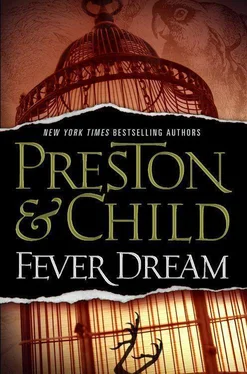Douglas Child - Fever Dream
Здесь есть возможность читать онлайн «Douglas Child - Fever Dream» весь текст электронной книги совершенно бесплатно (целиком полную версию без сокращений). В некоторых случаях можно слушать аудио, скачать через торрент в формате fb2 и присутствует краткое содержание. Жанр: Триллер, на английском языке. Описание произведения, (предисловие) а так же отзывы посетителей доступны на портале библиотеки ЛибКат.
- Название:Fever Dream
- Автор:
- Жанр:
- Год:неизвестен
- ISBN:нет данных
- Рейтинг книги:3 / 5. Голосов: 1
-
Избранное:Добавить в избранное
- Отзывы:
-
Ваша оценка:
- 60
- 1
- 2
- 3
- 4
- 5
Fever Dream: краткое содержание, описание и аннотация
Предлагаем к чтению аннотацию, описание, краткое содержание или предисловие (зависит от того, что написал сам автор книги «Fever Dream»). Если вы не нашли необходимую информацию о книге — напишите в комментариях, мы постараемся отыскать её.
Fever Dream — читать онлайн бесплатно полную книгу (весь текст) целиком
Ниже представлен текст книги, разбитый по страницам. Система сохранения места последней прочитанной страницы, позволяет с удобством читать онлайн бесплатно книгу «Fever Dream», без необходимости каждый раз заново искать на чём Вы остановились. Поставьте закладку, и сможете в любой момент перейти на страницу, на которой закончили чтение.
Интервал:
Закладка:
Ostrom seemed reluctant to proceed. "She believed... believed that a fellow named, ah, Ambergris was coming to Mount Mercy to exact revenge on her for an atrocity she claims to have committed years ago."
Once again, they resumed walking down the corridor. "Did she go into any detail on this atrocity?" Pendergast asked.
"It was all quite fantastical. Something about punishing some child for swearing by..." A second hesitation. "Well, by splitting his tongue with a razor."
An ambiguous head movement from Pendergast. D'Agosta felt his own tongue curling at the thought.
"At any rate," Ostrom continued, "she became violent--more violent, that is, than usual--and had to be completely restrained. And medicated. At the time of this alleged appointment with Ambergris, she had a series of seizures and passed away abruptly. Ah, here we are."
He entered a small room, windowless and sparely furnished with antique, unframed paintings and various soft knickknacks--nothing, D'Agosta noted, that could be fashioned into a weapon or cause harm. Even the stretchers had been removed from the canvases, the paintings hung on the wall with kite string. As D'Agosta looked around at the bed, the table, silk flowers in a basket, a peculiar butterfly-shaped stain on the wall, it all seemed so forlorn. He suddenly felt sorry for the homicidal old lady.
"There is the question of the disposition of the personal effects," the doctor went on. "I understand these paintings are quite valuable."
"They are," said Pendergast. "Send them over to the nineteenth-century painting department at Christie's for public auction, and consider the proceeds a donation to your good work."
"That's very generous of you, Mr. Pendergast. Would you care to order an autopsy? When a patient dies in custody, you have the legal right--"
Pendergast interrupted him with a brusque wave of his hand. "That won't be necessary."
"And the funeral arrangements--?"
"There will be no funeral. The family attorney, Mr. Ogilby, will be in touch with you about disposition of the remains."
"Very well."
Pendergast looked around the room for a moment, as if committing its details to memory. Then he turned to D'Agosta. His expression was neutral, but his eyes spoke of sorrow, even desolation.
"Vincent," he said. "We have a plane to catch."

10
Zambia
THE SMILING, GAP-TOOTHED MAN AT THE DIRT airstrip had called the vehicle a Land Rover. That description, D'Agosta thought as he hung on for dear life, was more than charitable. Whatever it might have been, now it barely deserved to be called an automobile. It had no windows, no roof, no radio, and no seat belts. The hood was fixed to the grille by a tangle of baling wire. He could see the dirt road below through giant rust holes in the chassis.
At the wheel, Pendergast--attired in khaki shirt and pants, and wearing a Tilley safari hat--swerved around a massive pothole in the road, only to hit a smaller one. D'Agosta rose several inches out of his seat at the impact. He gritted his teeth and took a fresh hold on the roll bar. This is frigging awful, he thought. He was hot as hell, and there was dust in his ears, eyes, nose, hair, and crevices he hadn't even known he had. He contemplated asking Pendergast to slow down, then thought better of it. The closer they came to the site of Helen Pendergast's death, the grimmer Pendergast became.
Pendergast slowed just slightly as they came to a village--yet another sorry-looking collection of huts built of sticks and dried mud, baking in the noonday sun. There was no electricity, and a single communal well stood in the middle of the lone crossroads. Pigs, chickens, and children roamed aimlessly.
"And I thought the South Bronx was bad," D'Agosta muttered more to himself than to Pendergast.
"Kingazu Camp is ten miles ahead," was Pendergast's reply as he stepped on the accelerator.
They hit another pothole and D'Agosta was again thrown in the air, coming down hard on his tailbone. Both arms were smarting from the inoculations, and his head hurt from the sun and vibration. About the only painless thing he'd endured in the past thirty-six hours was the phone call to his boss, Glen Singleton. The captain had approved his leave of absence with barely a question. It was almost as if he was relieved to see D'Agosta go.
Half an hour brought them to Kingazu Camp. As Pendergast maneuvered the vehicle into a makeshift lot beneath a grove of sausage trees, D'Agosta took in the trim lines of the photographic safari camp: the immaculate reed-and-thatch huts, the large canvas structures labeled DINING TENT and BAR, the wooden walkways linking each building to the next, the linen pavilions that sheltered comfortable deck chairs on which a dozen fat and happy tourists dozed, cameras dangling from their necks. Strings of tiny lights were strung along the rooflines. A generator purred off in the bush. Everything was done up in bright--almost gaudy--colors.
"This is straight out of Disney," D'Agosta said, getting out of the vehicle.
"A great deal has changed in twelve years," Pendergast replied, his voice flat.
They stood there a moment, motionless, without speaking, in the shade of the sausage trees. D'Agosta took in the fragrant smell of burning wood, the tang of crushed grass, and--more faintly--an earthy, animal muskiness he couldn't identify. The bagpipe drone of insects mingled with other sounds: the whine of the generators, the cooing of doves, the restless mutterings of the nearby Luangwa River. D'Agosta shot a covert glance at Pendergast: the agent was stooped forward, as if he bore a terrific weight; his eyes glittered with a haunted fire, and--as he took in the scene with what seemed like a strange mixture of hunger and dread--a single muscle in his cheek twitched erratically. He must have realized he was being scrutinized, because the FBI agent composed himself, straightening up and smoothing his safari vest. But the strange glitter did not leave his eyes.
"Follow me," he said.
Pendergast led the way past the pavilions and dining tent to a smaller structure, set apart from the rest of the camp in a copse of trees near the banks of the Luangwa. A single elephant was standing, knee-deep, in the mud of the river. As D'Agosta watched, the animal scooped up a trunkful of water, sprayed it over its back, then lifted its wrinkled head and emitted a harsh trumpeting sound that momentarily drowned out the hum of insects.
The small structure was clearly the administrative building for the camp. It consisted of an outer office, currently empty, and an inner office occupied by a lone man, sitting behind a desk and writing industriously in a notebook. He was about fifty, thin and wiry, his fair hair bleached by the sun and his arms deeply tanned.
The man looked up as he heard them approach. "Yes, what can I..." The words died in his throat as he caught sight of Pendergast. Clearly he'd been expecting to see one of the guests.
"Who are you?" he asked, rising.
"My name is Underhill," Pendergast said. "And this is my friend, Vincent D'Agosta."
The man looked at them in turn. "What can I do for you?" It seemed to D'Agosta that this was a man who didn't get many unexpected visitors.
"May I ask your name?" Pendergast asked.
"Rathe."
"My friend and I were on safari here, about twelve years ago. We happened to be back in Zambia again--on our way to Mgandi hunting camp--and thought we'd drop in." He smiled coldly.
Rathe glanced out the window, in the general direction of the makeshift parking area. "Mgandi, you say?"
Pendergast nodded.
The man grunted and extended a hand. "Sorry. All the goings-on these days, the rebel incursions and whatnot, a fellow gets a little jumpy."
Читать дальшеИнтервал:
Закладка:
Похожие книги на «Fever Dream»
Представляем Вашему вниманию похожие книги на «Fever Dream» списком для выбора. Мы отобрали схожую по названию и смыслу литературу в надежде предоставить читателям больше вариантов отыскать новые, интересные, ещё непрочитанные произведения.
Обсуждение, отзывы о книге «Fever Dream» и просто собственные мнения читателей. Оставьте ваши комментарии, напишите, что Вы думаете о произведении, его смысле или главных героях. Укажите что конкретно понравилось, а что нет, и почему Вы так считаете.











